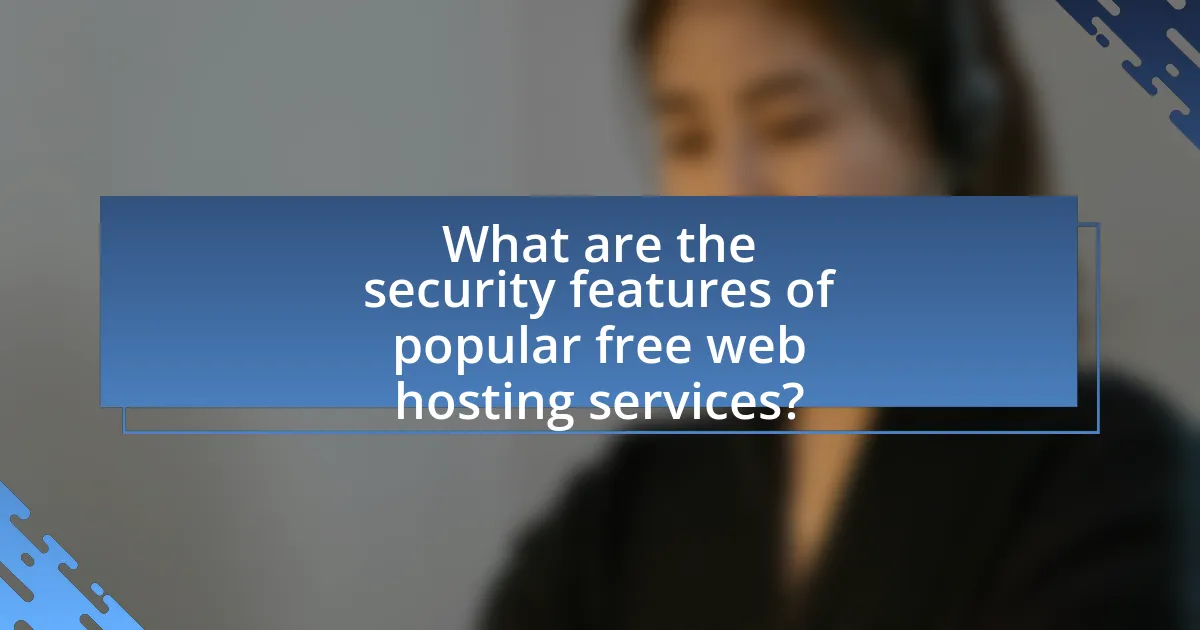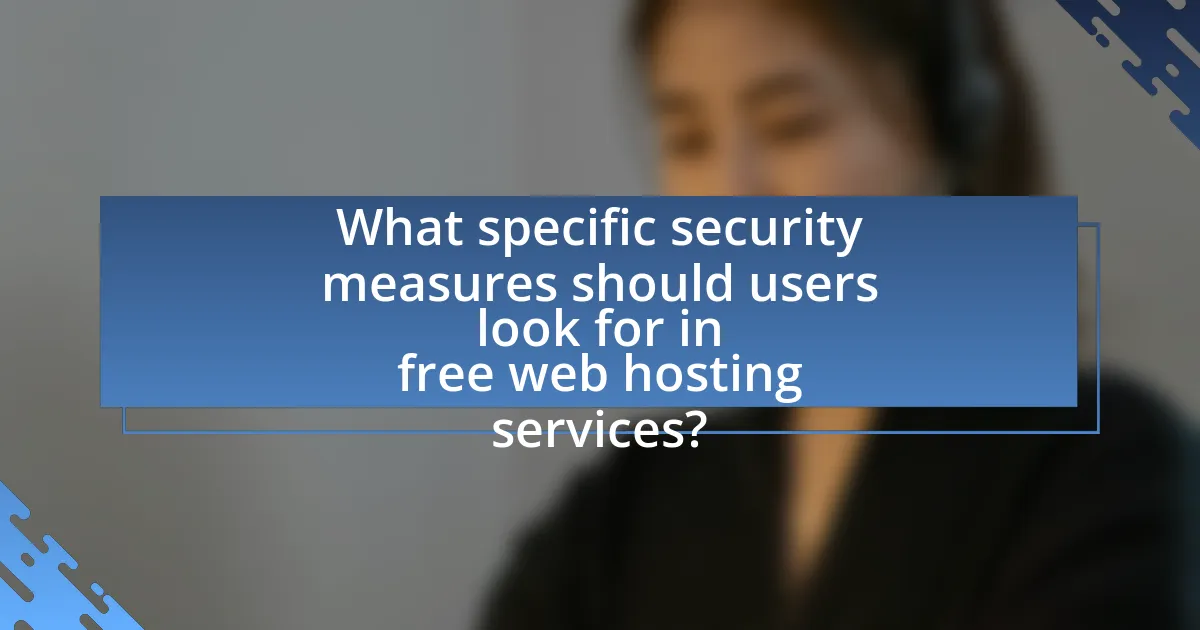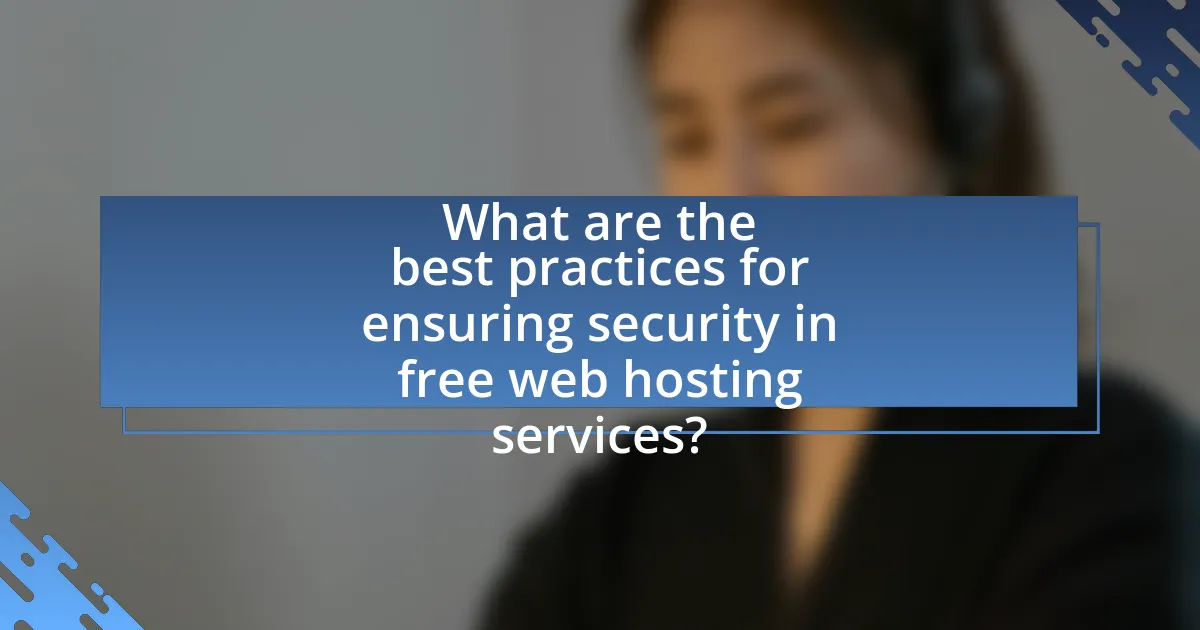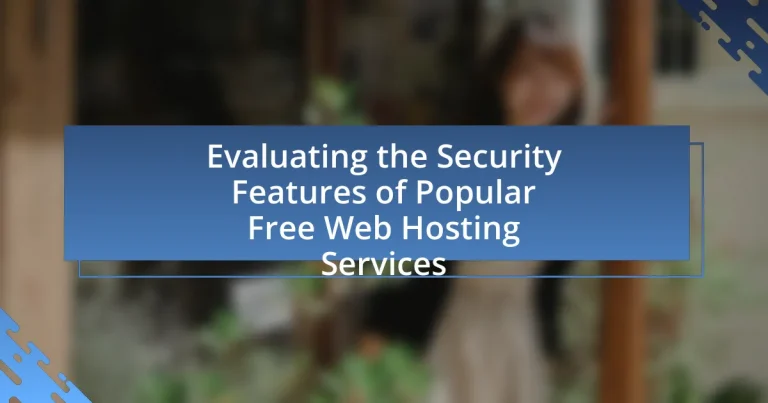The article focuses on evaluating the security features of popular free web hosting services, highlighting essential aspects such as SSL certificates, regular backups, and malware scanning. It discusses how these features protect user data through encryption, access controls, and timely software updates, while also addressing common vulnerabilities associated with free hosting. Additionally, the article outlines best practices for users to enhance security, including strong password management and the implementation of two-factor authentication. It emphasizes the importance of assessing security measures before selecting a hosting service to mitigate risks and ensure data protection.

What are the security features of popular free web hosting services?
Popular free web hosting services typically offer security features such as SSL certificates, regular backups, and malware scanning. SSL certificates encrypt data transmitted between the user and the server, enhancing data security. Regular backups ensure that user data can be restored in case of loss or corruption, while malware scanning helps detect and remove harmful software, protecting both the website and its visitors. These features are essential for maintaining a secure online presence, even in free hosting environments.
How do these security features protect user data?
Security features protect user data by implementing encryption, access controls, and regular security updates. Encryption safeguards data during transmission and storage, making it unreadable to unauthorized users. Access controls restrict data access to authorized personnel only, reducing the risk of data breaches. Regular security updates address vulnerabilities, ensuring that the system remains resilient against emerging threats. For instance, according to a 2021 report by Cybersecurity Ventures, organizations that employ robust security measures can reduce the risk of data breaches by up to 80%.
What encryption methods are commonly used in free web hosting services?
Common encryption methods used in free web hosting services include SSL (Secure Sockets Layer) and TLS (Transport Layer Security). These protocols encrypt data transmitted between users and the web server, ensuring secure communication. SSL and TLS are widely adopted due to their effectiveness in protecting sensitive information, such as login credentials and payment details, from interception by malicious actors. Many free web hosting providers offer SSL certificates to enhance security, reflecting industry standards for data protection.
How do firewalls contribute to the security of these services?
Firewalls enhance the security of web hosting services by monitoring and controlling incoming and outgoing network traffic based on predetermined security rules. They act as a barrier between trusted internal networks and untrusted external networks, effectively preventing unauthorized access and potential attacks. For instance, according to a report by the Cybersecurity & Infrastructure Security Agency (CISA), firewalls can block malicious traffic, such as Distributed Denial of Service (DDoS) attacks, which can disrupt service availability. By filtering traffic, firewalls also help in detecting and mitigating threats before they reach the web hosting servers, thereby safeguarding sensitive data and maintaining service integrity.
What are the common vulnerabilities associated with free web hosting?
Common vulnerabilities associated with free web hosting include limited security measures, lack of regular updates, and shared resources. Free web hosting services often do not provide robust security protocols, making websites susceptible to attacks such as cross-site scripting (XSS) and SQL injection. Additionally, these services may not implement timely software updates, leaving known vulnerabilities unpatched. The shared nature of resources in free hosting environments can lead to cross-contamination, where one compromised site can affect others on the same server. According to a 2021 study by the Cybersecurity & Infrastructure Security Agency, over 60% of free hosting services were found to have critical vulnerabilities that could be exploited by attackers.
How can users identify potential security risks in free web hosting services?
Users can identify potential security risks in free web hosting services by evaluating the provider’s security features, terms of service, and user reviews. Assessing the security features includes checking for SSL certificates, data encryption, and regular backups, which are essential for protecting user data. Additionally, reviewing the terms of service can reveal limitations on liability and data ownership, which may expose users to risks. User reviews often highlight experiences related to security breaches or inadequate support, providing insight into the reliability of the service. According to a 2021 study by the Cybersecurity & Infrastructure Security Agency, 60% of free hosting services lack basic security measures, underscoring the importance of thorough evaluation.
What role does software update frequency play in security?
Software update frequency is critical for maintaining security, as regular updates address vulnerabilities and enhance protection against emerging threats. Frequent updates ensure that known security flaws are patched promptly, reducing the window of opportunity for attackers to exploit these weaknesses. For instance, a study by the Ponemon Institute found that organizations that applied security patches within 30 days experienced 60% fewer breaches compared to those that delayed updates. This demonstrates that a proactive approach to software updates significantly mitigates security risks.
Why is it important to evaluate security features before choosing a service?
Evaluating security features before choosing a service is crucial to protect sensitive data and ensure compliance with regulations. Security features such as encryption, access controls, and vulnerability management directly impact the risk of data breaches and unauthorized access. For instance, according to a report by IBM, the average cost of a data breach in 2021 was $4.24 million, highlighting the financial implications of inadequate security. Additionally, services that lack robust security measures may not comply with standards like GDPR or HIPAA, leading to legal repercussions. Therefore, assessing security features is essential for safeguarding information and maintaining trust.
What impact do security features have on website performance?
Security features can negatively impact website performance by introducing additional processing overhead and latency. For instance, implementing HTTPS requires SSL/TLS encryption, which can slow down page load times due to the extra time needed for establishing secure connections. A study by Google found that enabling HTTPS can increase load times by approximately 10-20% due to the additional handshake process. Furthermore, security measures like firewalls and intrusion detection systems can add latency as they inspect incoming and outgoing traffic. Therefore, while essential for protecting user data and maintaining trust, security features can lead to slower website performance if not optimized properly.
How can inadequate security features lead to data breaches?
Inadequate security features can lead to data breaches by failing to protect sensitive information from unauthorized access. For instance, weak encryption methods allow attackers to easily intercept and decipher data during transmission, as evidenced by the 2017 Equifax breach, where inadequate encryption contributed to the exposure of personal information of 147 million individuals. Additionally, insufficient authentication protocols can enable unauthorized users to gain access to systems, as seen in numerous incidents where default passwords were exploited. These vulnerabilities highlight the critical need for robust security measures to safeguard data effectively.

What specific security measures should users look for in free web hosting services?
Users should look for SSL certificates, regular backups, malware scanning, and DDoS protection in free web hosting services. SSL certificates encrypt data transmitted between the user and the server, ensuring secure connections. Regular backups protect user data from loss due to server failures or attacks. Malware scanning helps identify and remove malicious software, enhancing overall security. DDoS protection mitigates the risk of distributed denial-of-service attacks, which can disrupt service availability. These measures are essential for maintaining a secure hosting environment and safeguarding user information.
How do SSL certificates enhance security in web hosting?
SSL certificates enhance security in web hosting by encrypting data transmitted between a user’s browser and the web server. This encryption protects sensitive information, such as login credentials and payment details, from interception by malicious actors. According to a study by Google, HTTPS (enabled by SSL certificates) can reduce the risk of man-in-the-middle attacks, which are common in unsecured connections. Additionally, SSL certificates help establish trust with users, as browsers display visual indicators, such as a padlock icon, signaling that the connection is secure. This trust can lead to increased user engagement and lower bounce rates on websites.
What types of SSL certificates are available for free web hosting?
Free web hosting services typically offer two main types of SSL certificates: Domain Validated (DV) SSL certificates and Let’s Encrypt SSL certificates. Domain Validated SSL certificates provide basic encryption and are issued after verifying the ownership of the domain, making them suitable for personal websites and small projects. Let’s Encrypt SSL certificates are a popular choice among free hosting providers, offering automated issuance and renewal, ensuring that websites maintain secure connections without manual intervention. Both types enhance website security by encrypting data transmitted between the server and users, which is essential for protecting sensitive information.
How can users verify the presence of SSL on their hosting service?
Users can verify the presence of SSL on their hosting service by checking for the “https://” prefix in the website URL and looking for a padlock icon in the browser’s address bar. These indicators confirm that the connection is secured with SSL encryption. Additionally, users can use online SSL checker tools, such as SSL Labs’ SSL Test, which provide detailed information about the SSL certificate, including its validity and configuration. This method is reliable as it assesses the SSL certificate directly from the server, ensuring that the hosting service implements SSL correctly.
What is the significance of regular backups in web hosting security?
Regular backups are crucial in web hosting security as they ensure data recovery in the event of data loss, corruption, or cyberattacks. By maintaining up-to-date copies of website data, businesses can quickly restore their operations and minimize downtime. According to a study by the University of Maryland, cyberattacks occur every 39 seconds, highlighting the need for robust backup strategies. Furthermore, regular backups protect against hardware failures and accidental deletions, reinforcing the overall security posture of web hosting services.
How often should backups be performed for optimal security?
Backups should be performed at least daily for optimal security. Regular daily backups minimize data loss and ensure that the most recent information is recoverable in case of a security breach or data corruption. According to a study by the National Cyber Security Centre, organizations that implement daily backups significantly reduce the impact of ransomware attacks, as they can restore their systems to a point before the attack occurred.
What backup options are typically offered by free web hosting services?
Free web hosting services typically offer limited backup options, often relying on manual backups or basic automated systems. Many of these services do not provide regular automated backups, leaving users responsible for creating their own backups. Some may offer a one-click backup feature, but this is not universally available. According to a survey by HostingAdvice, only 30% of free hosting providers include automated backup solutions, highlighting the lack of comprehensive backup support in this category.
How do user permissions and access controls affect security?
User permissions and access controls significantly enhance security by regulating who can access specific resources and what actions they can perform. By implementing strict user permissions, organizations can limit access to sensitive data, thereby reducing the risk of unauthorized access and potential data breaches. For instance, a study by the Ponemon Institute found that 63% of data breaches are linked to weak or stolen passwords, highlighting the importance of robust access controls in preventing such incidents. Additionally, access controls can enforce the principle of least privilege, ensuring users only have the permissions necessary for their roles, which minimizes the attack surface and enhances overall security posture.
What best practices should users follow regarding account access?
Users should follow several best practices regarding account access to enhance security. First, they should use strong, unique passwords for each account, as weak or reused passwords significantly increase the risk of unauthorized access. According to a study by the National Institute of Standards and Technology, using complex passwords can reduce the likelihood of password cracking.
Second, enabling two-factor authentication (2FA) adds an additional layer of security, making it harder for attackers to gain access even if they have the password. Research from Google indicates that 2FA can block 100% of automated bots and 96% of bulk phishing attacks.
Third, users should regularly review account activity and permissions to identify any unauthorized access or changes. Monitoring account activity can help detect breaches early, as highlighted by the Cybersecurity & Infrastructure Security Agency, which emphasizes the importance of vigilance in account management.
Lastly, users should be cautious about sharing account information and avoid accessing accounts over unsecured networks, as these practices can expose accounts to potential threats. The Federal Trade Commission advises against using public Wi-Fi for sensitive transactions to mitigate risks.
How can users manage permissions effectively in free hosting environments?
Users can manage permissions effectively in free hosting environments by utilizing the built-in control panels provided by the hosting service to set user roles and access levels. These control panels typically allow users to define specific permissions for different accounts, ensuring that only authorized individuals can access sensitive data or perform critical actions. For instance, many free hosting platforms offer features that enable users to assign roles such as administrator, editor, or viewer, which helps in maintaining a clear hierarchy of access rights. Additionally, users should regularly review and update these permissions to adapt to changes in team structure or project requirements, thereby minimizing the risk of unauthorized access.

What are the best practices for ensuring security in free web hosting services?
To ensure security in free web hosting services, users should implement strong password policies, regularly update software, and utilize SSL certificates. Strong passwords reduce the risk of unauthorized access, while keeping software updated protects against vulnerabilities. SSL certificates encrypt data transmitted between the server and users, enhancing security. According to a 2021 study by the Cybersecurity & Infrastructure Security Agency, 85% of data breaches involve weak or stolen passwords, highlighting the importance of robust password management. Regular updates and SSL usage are also recommended by the National Institute of Standards and Technology, which emphasizes their role in maintaining secure web environments.
How can users enhance their website security beyond hosting features?
Users can enhance their website security beyond hosting features by implementing strong passwords, enabling two-factor authentication, and regularly updating software and plugins. Strong passwords reduce the risk of unauthorized access, while two-factor authentication adds an additional layer of security, making it harder for attackers to gain entry. Regular updates are crucial because they patch vulnerabilities that could be exploited by cybercriminals. According to a report by Verizon, 81% of data breaches are linked to weak or stolen passwords, highlighting the importance of robust password practices. Additionally, the Cybersecurity & Infrastructure Security Agency emphasizes that keeping software up to date is essential for protecting against known vulnerabilities.
What role does strong password management play in web security?
Strong password management is crucial in web security as it significantly reduces the risk of unauthorized access to accounts and sensitive information. Effective password management practices, such as using complex passwords, regularly updating them, and employing unique passwords for different accounts, help mitigate the threat of brute-force attacks and credential stuffing. According to a study by the Cybersecurity & Infrastructure Security Agency, 81% of data breaches are linked to weak or stolen passwords, highlighting the importance of robust password management in protecting web services.
How can users implement two-factor authentication for added security?
Users can implement two-factor authentication (2FA) by enabling it in their account settings on supported platforms. This process typically involves linking a mobile device to the account, where users receive a verification code via SMS or an authentication app, such as Google Authenticator or Authy, after entering their password. According to a study by Google, enabling 2FA can block 100% of automated bots and 96% of targeted attacks, significantly enhancing account security.
What resources are available for evaluating the security of web hosting services?
Resources available for evaluating the security of web hosting services include independent review websites, security assessment tools, and industry reports. Independent review websites, such as HostingAdvice and PCMag, provide user reviews and expert evaluations of hosting services, focusing on security features like SSL certificates, DDoS protection, and data encryption. Security assessment tools, such as Qualys SSL Labs and SecurityHeaders.io, allow users to analyze the security configurations of hosting services, offering insights into vulnerabilities and compliance with best practices. Additionally, industry reports from organizations like the Cloud Security Alliance and Gartner provide comprehensive analyses of security trends and benchmarks in web hosting, helping users make informed decisions based on empirical data.
How can users find reviews and comparisons of free web hosting security features?
Users can find reviews and comparisons of free web hosting security features by visiting specialized technology review websites, forums, and user-generated content platforms. Websites like CNET, TechRadar, and HostingAdvice provide detailed comparisons and user reviews that evaluate the security features of various free web hosting services. Additionally, forums such as Reddit and web hosting communities allow users to share personal experiences and insights regarding security measures. These sources aggregate user feedback and expert analysis, making it easier for potential users to assess the security capabilities of different free web hosting options.
What tools can assist in assessing the security of a web hosting service?
Tools that can assist in assessing the security of a web hosting service include vulnerability scanners, penetration testing tools, and security auditing software. Vulnerability scanners, such as Nessus and OpenVAS, identify security weaknesses in the hosting environment by scanning for known vulnerabilities. Penetration testing tools like Metasploit allow security professionals to simulate attacks and evaluate the effectiveness of security measures. Security auditing software, such as Nikto, assesses web servers for potential security issues by performing comprehensive checks against best practices. These tools provide concrete insights into the security posture of web hosting services, enabling users to make informed decisions about their hosting choices.
What are the common troubleshooting steps for security issues in free web hosting?
Common troubleshooting steps for security issues in free web hosting include checking for malware, updating software, reviewing access logs, changing passwords, and ensuring proper permissions. First, scanning for malware helps identify any malicious code that may have been injected into the website. Next, keeping all software, including plugins and themes, updated minimizes vulnerabilities. Reviewing access logs allows users to detect unauthorized access attempts. Changing passwords regularly enhances security, while ensuring that file and directory permissions are correctly set prevents unauthorized access to sensitive areas. These steps are essential for maintaining the security integrity of free web hosting services.


